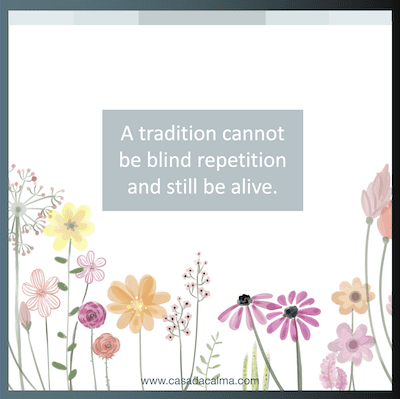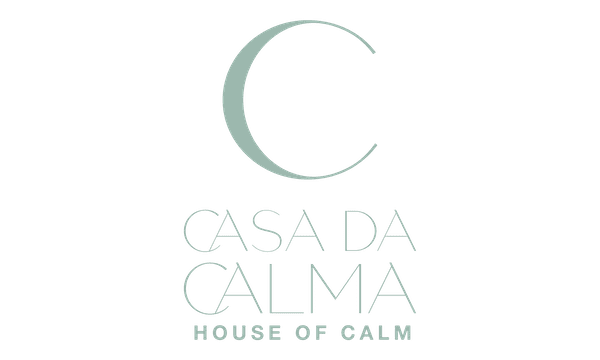Share

When we follow a tradition—in the truest sense of what healthy tradition means—we are grounding our faith in something that is an eternal truth and has eternal value. This comes about after some great cosmic reality has been discovered, and people have experienced the inherent rightness of it.
In other words, a truth of some nature has broken through from God’s divine Spirit World into human life here on Earth. People then see the goodness and the beauty that is inherent in such a breakthrough, and they want to keep it going.
Keeping traditions alive
To keep such a truth alive, we must feel an inner experience of it. And ritual celebrations are one way we can do this. They don’t, however, guarantee that a truth remains alive. For a ritual can become an empty gesture.
In a true and healthy tradition, then, we continually re-experience the essence of the inner breakthrough. No matter how long ago we formed the tradition, it’s still dynamically alive.
On the other hand, when a tradition has become distorted, this means it is now a dead weight. It’s a meaningless carryover. This doesn’t necessarily mean it never had any deeper meaning. But in this moment, the true meaning has been lost.
As a result, many rituals are now mechanical motions, since any deeper or truer reality has been flattened and perhaps even wiped out. What we are now carrying on is a process of death, rather than of life.
Another way that traditions become distorted is by continuing a meaningful custom—one that was valid at a certain point in history—after circumstances have completely changed. For it doesn’t make sense to carry over a tradition as a blind habit, without thinking through the divine truth that the tradition originally contained.
Aliveness, after all, means awareness and the use of an active thinking process. A tradition cannot be blind repetition and still be alive.
Overly embracing tradition
Our varying responses to tradition are deeply embedded in our personalities. Some will put so much value on tradition that they lose all sense of proportion and go overboard whenever a tradition is at stake. A person with this kind of perspective believes that only what conforms to the past—to tradition—has value.
They will rigidly reject any kind of change. Yet this is, of course, a particularly foolish approach. Because the very tradition we now adhere to must have, at one time, come into being through a process of change.
So the paradox of tradition is that if we are not willing to continually change, we cannot keep unchanging truths alive. Therefore, to embody a living healthy tradition, we must always couple our traditions with change. In other words, we must create a healthy balance between maintaining a tradition and being willing to change, for these two things interoperate in a harmonious balance.
To do otherwise—to blindly follow tradition—is to create extreme orthodoxies that have no meaning. This happens in religions as well as in the human soul. These orthodoxies impose a heaviness on a group of people that have a resistance to change.
So the soul sends a message saying to preserve the authentic truths, beauties and values that came through at some time in our past. But what’s forgotten is the reality that such truths first came to Earth because of someone’s struggle to find divine meaning and overcome their fear of change.
Rebelling against tradition
There are others who rebel against any kind of tradition, whether it’s now meaningless and dead or still very real and alive. The blindness here is in believing that only new findings are of value, and that anything existing from the past is invalid and inferior.
The shortsightedness here overlooks the fact that eternal values have always existed, and always will exist. And they may break through into our consciousness at any time, provided we make it possible for them to manifest.
Entering the New Era
As we each prepare ourselves to step into the new era, we need to not blindly worship tradition, and also not blindly rebel against it. We must become willing to examine specific traditions with intelligence as well as self-honesty. We must search inside to see if we have a personal stake in either maintaining a certain tradition or in rebelling. Also, we will need to explore whether a given tradition still makes sense.
By adopting the right attitude, we won’t feel rebellious when an old tradition is discontinued, or when it gets replaced by a new custom or a fresh ritual or celebration. At times, we may discover that an old tradition is superseded by values and truths that feel more meaningful for us today.
Such an approach will keep us living dynamically in the present moment. We will value what deserves to be valued from the past. And at the same time, we will be able to let go of the past and create a new future that’s not a dead repetition of the past.
Finding the unity
On this plane of duality, we speak of the new and the old. And often we think of one as being good and the other as being bad. This, of course, can go either way. A traditionalist will think of the old as good, unthreatening, and full of value. Meanwhile, anything new will be seen as wrong, bad, threatening and disrupting.
Others will view things that are old as outdated and undesirable, while considering anything new as good and desirable. We can only transcend this duality by searching for the positive and negative in both sides.
For if we search more deeply into spiritual reality, we’ll see that neither of the terms “old” and “new” make sense. For there isn’t old or new, there is both. Everything existing now has already existed and will always exist. What’s changed—what is new—is that something existing in ultimate reality “vibrates through” into our world of matter. For our level of matter is actually a condensation of finer vibratory forms that already exist on another level.
This concept applies not only to objects, but also to concepts, values, truths and laws. Let’s apply this idea to traditions. When an eternal truth vibrates its way into our dimension of reality, it loses something. For it’s automatically separated from its entire meaning in the process of entering our reality and is therefore diminished somewhat. This is inevitable since our reality is a limited one.
What’s more, what started out in unity gets split into duality here in this dimension. This also causes much of the original meaning to get lost and distorted. To see a great truth, then, and recapture it in its entirety, we must struggle to see beyond the dualistic limitations of our reality.
Such a movement asks us to embrace the old and the new, the tradition and the change. This is how some “new” divine truth breaks through and expands our reality. There is a constant movement toward renewing life and giving new life to eternal laws and truths.
Breaking tradition
As we walk a spiritual path, we will discover new truths we hadn’t known before. So they are new to us, but they are not really new. These truths existed before we knew them. Yet each time we are introduced to a new spiritual concept, a new approach, or a new expanded way of thinking, we experience great resistance. For new truths create a sense of threat.
Our desire is to hold onto our old approach which we are familiar with, leaving the confines of our thinking and perceiving untouched and unexpanded. Because seeing the world in a new light feels threatening. We want to hold on to what we know and become a traditionalist.
This is why we tend to greet any new phase in our development with rebellion. We rebel against any authority that asks us to break the tradition we’ve become accustomed to. In reality, we are always creating traditions, on the largest scales of societies as well as on smaller, more temporary scales. Along the way, we become comfortable.
Avoiding stagnation
Many spiritual, religious and psychological truths have filtered into our world of matter, only to stagnate. What once had deep value faltered because people were afraid to antagonize those who want to obstruct movement and stop change. It takes vitality to stand up to those who oppose expansion and movement.
Eventually, our current traditions must be broken—renewed—by adding new truths to our current ways. Over time, we learn to accept and trust new truths, and incorporate them into our lives. In this way, a temporary “new” tradition comes into being, until something else “new” comes vibrating through with the next breath of life.
The way to widen and expand our consciousness is by continually allowing and trusting new/old truths to manifest and not obstructing them. This is how we add more and more wisdom, freedom and abundance to our lives.
If we don’t do this, we can’t grow. For growth can only happen when movement is allowed, combining the old together with the new. By both retaining tradition and renewing and enlivening it through change.
–The Pathwork Guide’s wisdom in our words
Adapted from Pathwork Guide Lecture #246: Tradition: It’s Divine and Distorted Aspects
About Santo Daime: How Santo Daime heals • Santo Daime hymns • Santo Daime and addictions • Santo Daime and Pathwork
About Mediumship: Part 1: The purpose of mediumship • Part 2: Influence between the Spirit World and humanity • Part 3: General facts about mediumship • Part 4: Basic attitudes, laws and protection • Part 5: Practices, pitfalls & confusions, and limits • Part 6: Mediumship in Santo Daime
About Casa da Calma: Visitor information • What to Expect • How to get here • Visitor forms • Contact us • How we integrate Pathwork

